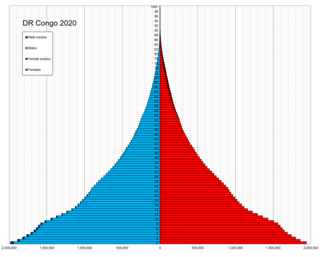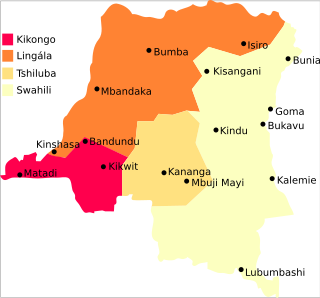The earliest known human settlements in what is now the Democratic Republic of the Congo have been dated back to the Middle Stone Age, approximately 90,000 years ago. The first real states, such as the Kongo, the Lunda, the Luba and Kuba, appeared south of the equatorial forest on the savannah from the 14th century onwards.

Demographic features of the population of the Democratic Republic of the Congo include ethnicity, education level, health, economic status, religious affiliations and other aspects of the population.

The Democratic Republic of the Congo is a country in Central Africa. By land area, the DRC is the second-largest country in Africa and the 11th-largest in the world. With a population of around 112 million, the Democratic Republic of the Congo is the most populous Francophone country in the world. The national capital and largest city is Kinshasa, which is also the economic center. The country is bordered by the Republic of the Congo, Central African Republic, South Sudan, Uganda, Rwanda, Burundi, Tanzania, Zambia, Angola, the Cabinda exclave of Angola, and the South Atlantic Ocean.

Congolese music is one of the most influential music forms of the African continent. Since the 1930s, Congolese musicians have had a huge impact on the African musical scene and elsewhere. Many contemporary genres of music, such as Kenyan Benga and Colombian Champeta, have been heavily influenced by Congolese music. In 2021, Congolese rumba joined other living traditions such as Jamaican reggae music and Cuban rumba on UNESCO's "intangible cultural heritage of humanity" list.

The First Congo War (1996–1997), also nicknamed Africa's First World War, was a civil war and international military conflict which took place mostly in Zaire, with major spillovers into Sudan and Uganda. The conflict culminated in a foreign invasion that replaced Zairean president Mobutu Sese Seko with the rebel leader Laurent-Désiré Kabila. Kabila's unstable government subsequently came into conflict with his allies, setting the stage for the Second Congo War in 1998–2003.
The Chelkans are a small group of Turkic Indigenous people of Siberia. They speak the Northern Altai Chelkan language. Those residing in Altai Republic are sometimes grouped together with the Altai ethnic group and those in Kemerovo Oblast are grouped with the Shors; however, they are recognized as a separate ethnic group within the list of Indigenous small-numbered peoples of the North, Siberia and the Far East by ethnographers and the Resolution of the Government of the Russian Federation No. 255 dated March 24, 2000, and Russian Census (2002). But, during the 2010 census, they were again "united" with the Altaians. According to the 2010 census, there were 1,181 Chelkans in Russia.

The culture of the Democratic Republic of the Congo is extremely varied, reflecting the great diversity and different customs which exist in the country. Congolese culture combines the influence of tradition to the region, but also combines influences from abroad which arrived during the era of colonization and continue to have a strong influence, without destroying the individuality of many tribal customs.

The Lugbara are a Central Sudanic ethnic group who live primarily in the West Nile region of Uganda, in the adjoining area of the Democratic Republic of the Congo (DRC) with a few living in South Sudan. They speak the Lugbara language, a Central Sudanic language similar to the language spoken by the Madi, with whom they also share many cultural similarities.
The Otuho people, also known as the Lotuko, are a Nilotic ethnic group whose traditional home is the Eastern Equatoria state of South Sudan. They speak the Otuho language.
Tama are a non-Arab, African ethnic group of people who live in eastern Chad and western Sudan. They speak Tama, a Nilo-Saharan language. The population is 200,000–300,000 people and they practice Islam. Many Tama are subsistence farmers who live in permanent settlements and some raise livestock. In the civil war in Chad the Tama were involved in ethnic conflicts with the Zaghawa tribe.

The Democratic Republic of the Congo is a multilingual country where an estimated total of 242 languages are spoken. Ethnologue lists 215 living languages. The official language, since the colonial period, is French, one of the languages of Belgium. Four other languages, three of them Bantu based, have the status of national language: Kikongo-Kituba, Lingala, Swahili and Tshiluba.

The Keliko or Kaliko are an ethnic group in South Sudan and the Democratic Republic of the Congo, with immigrants in Uganda. Most members of the Keliko are Christians. In the Democratic Republic of the Congo, they are called kaliko umi, more especially from Laibo, Mado, awubha awuzi and so on. There is a slight pronousation between Kaliko people in South Sudan and those in the DRC.

Masisi Territory is a territory which is located within the North Kivu Province of the Democratic Republic of the Congo. Its political headquarters are located in the town of Masisi.

Women in the Democratic Republic of the Congo have not attained a position of full equality with men, with their struggle continuing to this day. Although the Mobutu regime paid lip service to the important role of women in society, and although women enjoy some legal rights, custom and legal constraints still limit their opportunities.
The Gabonese people have forged since the independence of the country, in 1960, their own culture which is neither the traditional culture of the different ethnic groups which compose it, nor modern Western culture. It is a culture in movement, a mixture of diversity and common traits, bringing together the most diverse beliefs and practices.
The Ubangian languages form a diverse linkage of some seventy languages centered on the Central African Republic and the DR Congo. They are the predominant languages of the CAR, spoken by 2–3 million people, including one of its official languages, Sango. They are also spoken in Cameroon, Chad, the Republic of Congo and South Sudan.
Congolese Americans are Americans descended from the peoples of the Democratic Republic of the Congo and the Republic of the Congo, which consist of hundreds of ethnic groups.
The Hemba people are a Bantu ethnic group in the Democratic Republic of the Congo (DRC).

The African Pygmies are a group of ethnicities native to Central Africa, mostly the Congo Basin, traditionally subsisting on a forager and hunter-gatherer lifestyle. They are divided into three roughly geographic groups:

The Sango people are an ethnic group living on the banks of the Ubangi River in the Central African Republic. They speak a Northern Ngbandi-based creole language called Sango, which belongs to the Ubangian branch of the Niger-Congo family.










